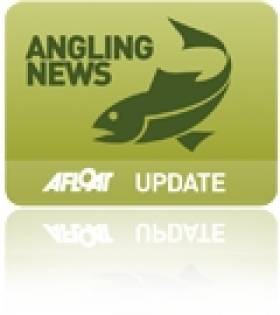Displaying items by tag: bylaws
New Bylaws for Salmon and Trout Angling
#Angling - Six new bylaws of relevance to the angling community and the commercial fishing industry have been signed into law this week by Minister of State Fergus O'Dowd.
The Conservation of Sea Trout Bye-Law provides for a daily bag limit of three sea trout (less than 40cm in length and provides for the use of single barbless hooks and prohibits the use of worms as bait once the specified number of sea trout has been caught.
The Prohibition of Angling Methods Bye-Law prohibits the use of any fish hooks, other than single barbless hooks, and also prohibits the use of worms as bait in angling for all species of fish in the waterways specified.
The Conservation of Salmon and Sea Trout (Newport River) Bye-Law provides for catch and release in respect of Salmon and Sea Trout (over 40 cm) in the Newport River including the waters of Lough Beltra and the Crumpaun River, Co Mayo during the period 20 March to 11 May 2013.
The Conservation of Salmon and Sea Trout (River Nore) Bye-Law provides for catch and release in respect of Salmon and Sea Trout (over 40 cm) in the River Nore during the period 17 March to 11 May 2013.
The Conservation of Salmon and Sea Trout (River Slaney) Bye-Law extends the annual close season in angling for salmon, sea trout and brown trout in the River Slaney and its tributaries in the year 2013 from 26 February to 16 March and from 17 September to 30 September. The bylaw provides for catch and release during the period 17 March to 16 September in angling for salmon and sea trout. It also provides for the use of artificial fly only with single barbless hook upstream of the Old Bridge in Enniscorthy, and provides for single barbless hook and a ban on worms as bait downstream of the bridge when angling for salmon or sea trout.
Finally, the Draft Nets and Snap Nets Bye-Law sets out the opening and closing dates (and hours) for the draft net and snap net salmon and sea trout (salmon includes sea trout as defined in the Inland Fisheries Act 2010) commercial fishing season 2013 and prohibits draft net and snap net fishing for (salmon and sea trout) in all fishery districts except those mentioned in the schedule. It also prohibits the use of monofilament material in draft nets, with the exception of Cork Harbour and Castlemaine Harbour where monofilament material in draft nets is permitted.
New Harbour Charges Could End Trips to See Fungie
#IRISH HARBOURS - "Draconian" new charges for harbour users could bring an end to boat trips to see Dingle's most famous resident, according to The Irish Times.
Fungie the dolphin has been a mainstay of Dingle harbour for almost 30 years, but boat trips to visit him could cease to operate "with immediate effect" if charges of up to €9,000 are imposed "in advance" of the season.
Currently operators in the Dingle Boatmen's Association pay around €2,500 to use the harbour at the end of each season.
Association chairman Jimmy Flannery called on anyone working in tourism in Ireland to make submissions to the public consultation before the deadline next Friday 20 April.
As previously reported on Afloat.ie, yacht owners are also up in arms over the new charges proposed by Marine Minister Simon Coveney that could see their rates hiked by an incredible 800 per cent.
And the news comes not long after fellow Kerry harbour users protested proposed new bylaws to regulate their activities and impose new charges.
Kerry Harbour Users Say No to Over-Regulation
#IRISH HARBOURS - Protesters took to the water off Kerry's piers last month in an organised swim drawing attention to proposed harbour bylaws designed to regulate the activities of water users.
“We need to make the public aware they have to make submissions,” Denise Collins told The Irish Times from Kells, which hosted one of the largest swims. “Traditional activities such as swimming will be over-regulated, we fear.”
The proposed bylaws would give Kerry County Council greater control over 16 of the county's 57 harbours and piers, including Kells, Kenmare, Portmagee, Brandon and Ventry.
Under the new bylaws, strict regulations would be placed on the use of loudhailers, landing and unloading passengers and freight, waste and even movement around the harbour.
"Draconian" charges are also set to be imposed on fishermen and other harbour users, while campaingers also feel that a ban on swimming and diving could also be added to the list.
The proposed bylaws already suffered a set-back earlier this year when Kerry County Councillors decided to restart the consultation process to allow the fishing industry, tourism operators and other interests more time to make submissions.
According to the Irish Examiner, only two submissions had been received by the council as of its January monthly meeting, despite senior council officials working for months on the draft proposals.
Cllr Toiréasa Ferris commented that the proposed charges in particular "would have huge implications for fishermen, some of whom might currently be earning only between €40 and €50 for a 14-hour day."
As previously reported on Afloat.ie, charges may also soon be hiked on yachts berthing at Ireland's main fishing harbours, a list that includes Dingle in Co Kerry.
Irish Marine Federation chairman David O'Brien expressed concern at the potential for such charges to damage "the good tourism dividend for coastal towns", noting that for every euro spent on a harbour berth, €10 was normally spent in the locality.


























































